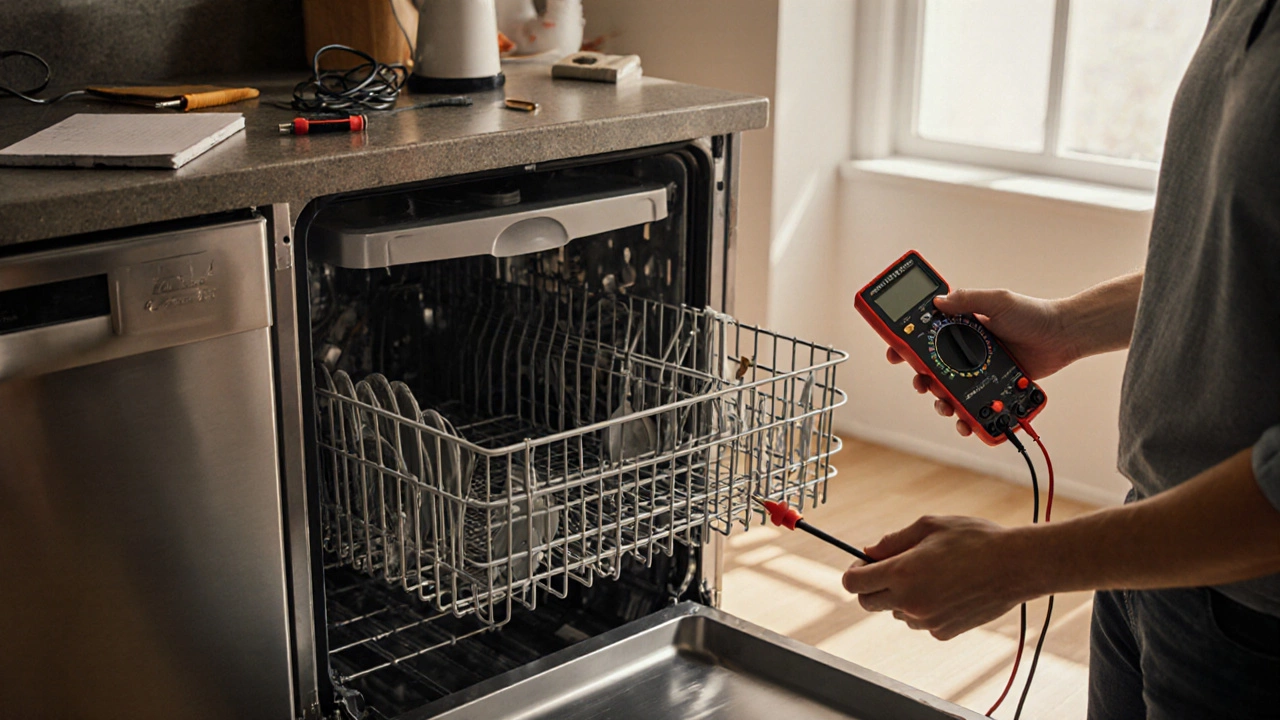
- 17 Nov 2024
- Gideon Thornton
- 0
For many, the dishwasher is a kitchen essential, saving time and effort in our daily routines. However, just like any other home appliance, it can occasionally falter. When it does, we're faced with a decision: should it be repaired, or is it time to consider purchasing a new one?
Making this decision involves taking a close look at various factors. From the age of the dishwasher to its current performance, and how often you've had to call for repairs, several indicators can guide you. We'll walk through each element to help you make a choice that's right for your home and your pocket.
- Signs Your Dishwasher Needs Repair
- Common Dishwasher Problems and Quick Fixes
- Evaluating the Cost of Repair vs Replacement
- When to Consider a New Dishwasher
- Tips for Maintaining Your Dishwasher
Signs Your Dishwasher Needs Repair
Modern dishwashers, like most home appliances, are built to operate smoothly for a number of years. But there comes a point when even the most robust machines show signs of wear and tear. One of the first indicators that your dishwasher is in trouble is if it suddenly becomes unusually noisy. While some noise is part of normal operation, grinding or rattling sounds can suggest something is amiss inside. Such sounds might stem from misaligned components or something small caught in the mechanism. It's essential to address strange noises promptly to prevent more extensive damage.
Another clear signal is when your dishes are not coming out as clean as they used to. If you find food residue clinging stubbornly to plates and glasses, it could be due to insufficient water pressure or problems with the spray arms. In some cases, it might be a sign of a failing motor. Regular maintenance like cleaning the filter and ensuring the spray arms are clear of debris can mitigate minor problems, but persistent issues often require professional assistance. A third sign is leaking water, which is always a cause for concern. Leaks not only damage your kitchen floor but can lead to expensive underlying issues if not addressed.
Often, dishwashers leak due to faulty door seals or broken hoses. A simple examination might reveal if the seal is worn out or if there's any visible damage to the hoses. If these elements seem intact, yet the problem remains, you may be dealing with a more significant internal fault. As another example, if your dishwasher struggles to drain properly, indicated by water pooling at the bottom of the machine, you may have a clogged drain or a faulty pump. Drains can become obstructed with bits of food and other debris over time, compromising the dishwasher's ability to expel water efficiently.
Energy efficiency issues are also telling. An inefficient dishwasher can lead to higher energy bills, largely unnoticed until you start to see the spikes in monthly cost. Often, older appliances lose their efficiency gradually, but any abrupt change should prompt a careful evaluation. Gathering accurate data is vital here, as sometimes energy inefficiency can indicate heating element problems, which would need specialist intervention. An honest assessment comparing repair costs with the potential savings from a new, energy-efficient model will guide your decision.
According to the American Council for an Energy-Efficient Economy, replacing even a moderately new appliance with an Energy Star-rated model can lead to a 10-20% reduction in energy use. Such savings should factor into your repair or replace deliberations.
Lastly, control panel problems can be frustrating and often signal electronic failures. From unresponsive buttons to error messages on the display, these electronic issues can stem from worn circuits or moisture ingress. In the complex modern dishwasher, a malfunctioning control panel can disrupt operation schedules or prevent the dishwasher from starting altogether. To handle electronic issues effectively, the expertise of an experienced technician might be necessary to diagnose and correct it.
Common Dishwasher Problems and Quick Fixes
Dishwashers, while incredibly convenient, are not immune to issues. Over time, wear and tear can lead to various problems, each requiring different levels of intervention. One of the most frequent problems users encounter is a dishwasher that doesn't clean dishes thoroughly. This issue might stem from a clogged spray arm or a blocked detergent dispenser. To fix this, start by removing the spray arm and cleaning any debris lodged inside. This simple step can significantly enhance your dishwasher's performance, making it feel almost like new. Another issue might be the detergent not dissolving properly, often caused by using the wrong kind of detergent or overloading the machine. Ensuring you're using the right detergent for your machine, as well as not cramming it full, can save you a lot of headaches.
Another common complaint involves the dishwasher not draining completely. This issue can sometimes be traced back to a clogged filter or drain hose. First, check the filter at the bottom of the dishwasher—it may be full of food particles and should be cleaned regularly. If the filter is clean, the problem might lie with the drain hose. Make sure it's free of kinks and clogs. Sometimes, merely adjusting the hose can solve the drainage issue. An unusual noise during cycles is another problem that you might encounter. This could be due to an object stuck in the dishwasher or a fault with the circulation pump. Carefully inspecting the machine for any loose items or debris can be surprisingly effective. If neither of these is the cause, the pump might need professional servicing. Occasionally, the dishwasher might not start at all, which could be a sign of a faulty door latch preventing the machine from operating. Double-check that the door is closing completely and the latch mechanism is functional.
"A surprising amount of dishwasher troubles can be prevented with regular maintenance and proper use," according to Consumer Reports, a leading resource in appliance reviews. Such maintenance includes running the machine empty with a specialized cleaner every few months to clear out any build-up that might impede performance.
Persistent or recurring issues, such as strange aromas during operation or visible water leaks, should never be ignored. Strange odors often result from mold or bacteria formation due to trapped moisture. To combat this, run the cycle with a cup of white vinegar on the top rack—this helps sanitize and deodorize. Leaks, on the other hand, might indicate worn-out door seals or defective pump seals. Replacing these parts can often resolve the problem. Proper maintenance is key to extending the lifespan of your appliance, and basic knowledge in diagnosing problems can help you manage repairs yourself before throwing in the towel for a replacement. Undoubtedly, good dishwasher maintenance practices, like regularly cleaning the filter and interior, can prevent issues from escalating, ultimately keeping repair costs down and extending the life of this essential appliance.

Evaluating the Cost of Repair vs Replacement
Deciding whether to repair your current dishwasher or replace it with a new one can sometimes feel like a tricky riddle. There are several key factors to weigh in the balance, with cost being at the forefront. The repair expenses can range from minor fixes that cost a few bucks, to more serious overhauls that might have you reaching into your savings. One useful rule of thumb is the 50% rule: if any repair is expected to cost more than half the price of a new dishwasher, replacement might be the wiser choice. It don't just end with the immediate expense; considering the longevity and efficiency of the device also comes into play.
Age is another significant determinant in this deliberation. A dishwasher that has reached or surpassed the decade mark often warrants careful scrutiny. According to appliance experts, the average lifespan of a dishwasher is about 10 years. While there are exceptions with good maintenance, parts tend to wear out, and newer models bring advanced efficiency and functionality that the older beasts simply lack. So, if your machine is around 8-10 years old, and gives you frequent repair headaches, it might be worth shopping around for a new one.
Energy efficiency and environmental impact are not to be overlooked either. Modern dishwashers have made leaps in minimizing water and electricity usage. Switching to a more efficient appliance can significantly slash monthly utility bills. An insightful 2022 study from the National Resources Defense Council found that dishwashers manufactured post-2015 use roughly 5.5 gallons of water per cycle, compared to earlier models which can use over 10 gallons per run. Multiply these savings over years, and the financial (and environmental) benefits are clear.
"Investing in energy-efficient appliances does more than just reduce utility bills; in the long run, it helps conserve our planet's resources too," says Jordan Hendricks, an eco-efficiency expert.
Of course, we can't ignore the downtime involved in repairs. Scheduling service calls, waiting for parts, and the accompanying inconvenience of being without a key household aid can all add layers to the repair decision matrix. On the flip side, the excitement of unboxing a new appliance and enjoying the updated features can't be quantified in raw dollars but does represent value nonetheless. There's also the warranty aspect to think about. New dishwashers come equipped with a manufacturer's warranty, while repairs on older appliances might not always guarantee extended protection or performance. In the end, taking these points into consideration will help provide a clear path to follow in your dishwasher dilemma.
When to Consider a New Dishwasher
Recognizing the moment to let go of your trusty dishwasher and start fresh with a new one isn’t always straightforward. There are signs that you shouldn’t ignore, especially if the appliance is older than ten years. Most dishwashers last around a decade; after that, efficiency can decrease significantly. If your dishwasher frequently breaks down, this is one of the first indicators it might be time for a change. Constant repairs can become costly, and sometimes replacing the whole machine is more cost-effective than one more repair job.
When your machine stops cleaning dishes efficiently, it’s not just an inconvenience; it’s a wake-up call. Poor performance often means the appliance’s components are wearing out, from the filter to the pump. In older models, mineral buildup, which you might have noticed as white spots on glassware or dishes, could be affecting the heating element. Modern dishwashers come with improved washing systems and energy-saving technologies that ensure your dishes come out spotless, while also being gentle on the planet.
Another consideration is energy efficiency. Older appliances consume more water and electricity, increasing your environmental footprint and utility bills. Energy Star-rated dishwashers, which are prevalent among newer models, can save gallons of water per cycle and use technology designed to clean effectively even at lower temperatures. An investment in these benefits not only reduces your expenses but also supports global environmental efforts.
Assessing the Costs: Repair vs Replacement
It’s wise to weigh the repair costs against the price of a new dishwasher. A good rule of thumb is that if your repair costs are more than half the price of a new one, it might be time to buy. In addition to the price tag, factor in your repair history and ongoing maintenance expenses. Those will tell a story, especially if repairs have been happening more frequently. Savvy buyers understand that sometimes a new purchase saves more money in the long run.
- Frequent breakdowns signal underlying issues.
- Increasing repair bills might not be worth the hassle.
- Energy efficiency is a game changer for cost savings.
- A rule of thumb: replace if repair costs exceed 50% of a new dishwasher.
Aesthetics and features shouldn't be overlooked either. As unspectacular as a dishwasher might seem, having an ergonomic and visually pleasing appliance can enhance your kitchen’s value and appearance. New gadgets mean improved capacity, quieter cycles, and even smart home capabilities, like scheduling or monitoring cycles remotely via apps.

Tips for Maintaining Your Dishwasher
There's an old saying in the world of appliances that goes, 'Take care of your machines, and they'll take care of you.' This sage advice certainly holds true when it comes to your faithful dishwasher. With a little bit of regular upkeep, you can extend the life of your appliance, keep it running efficiently, and avoid those dreaded repair bills. A well-maintained dishwasher not only cleans better but also saves time and energy, making it a win-win situation for anyone using it. One of the first, and perhaps most overlooked, steps in maintaining your dishwasher is simply keeping it clean. Over time, bits of food, grease, and soap scum can build up in the machine, leading to unpleasant odors and even clogs. By routinely inspecting the filter and giving it a good wash every month, you'll prevent this gunk from accumulating. Additionally, running an empty cycle with vinegar can help eliminate any lingering smells and dissolve any mineral buildup inside the machine.
Another key consideration is how you load your dishwasher. Follow the manufacturer's guidelines to ensure that your dishes are placed correctly. This not only guarantees cleaner dishes but also prevents damage to the rotating sprayers. Avoid overloading the dishwasher, as this can strain the motor and lead to less effective cleaning. Using the appropriate type and amount of detergent is also crucial. Too much soap can leave behind residue, while the wrong detergent can be harmful to the appliance over time. If you're ever in doubt, check the manual for recommendations on what works best with your model.
Regularly inspecting the dishwasher's door seal can also prevent potential leaks. This molded rubber gasket creates a watertight barrier, but it can become cracked or loose over time. Simply wiping it down occasionally with a damp cloth can help maintain its elasticity and prevent wear. If you start noticing puddles around your dishwasher, it's worth checking this seal as the possible culprit. Additionally, attention should be paid to the condition of the spray arms, which can frequently become clogged with bits of food or limescale. Removing and cleaning them periodically ensures they rotate freely and distribute water effectively.
Energy consumption is another area where maintenance comes into play. Older dishwashers can be energy guzzlers, but proper upkeep can mitigate this to some extent. Run full loads whenever possible to conserve water and electricity, and consider air drying instead of using the heat-dry option. This small change can lead to significant savings on your utility bills over time. It's also beneficial to check the temperature of the water heater; a setting of about 120 degrees Fahrenheit is ideal for most dishwashers and ensures optimal operation without being wasteful. As the famous appliance designer Henry Dreyfuss once noted:
'Design is not just what it looks like and feels like. Design is how it works.' Keeping your dishwasher in pristine condition is not solely about appearance, but about ensuring it functions at its best.
To wrap up, embracing a proactive maintenance routine for your dishwasher can greatly enhance its lifespan and reliability. With consistent attention to cleanliness, optimal loading practices, and regular inspections of key components, you'll ensure your appliance continues to serve your household without a hitch. In this manner, choosing to focus on maintenance before problems arise becomes a realistic and sustainable approach to household management, keeping both your pocket and your dishes happier in the long haul.



